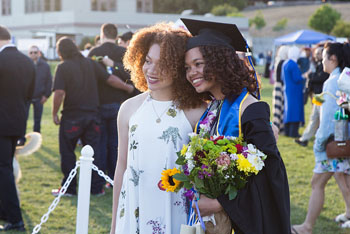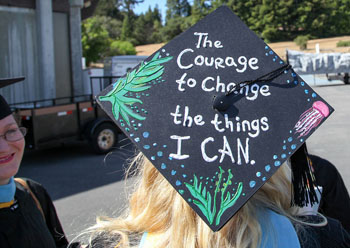Campus News
A day in the sun for UC Santa Cruz grads
As they awaited to receive their diplomas, UC Santa Cruz scholars reflected on friendship, mentors and inspiration.




Painstakingly hand-decorated graduation caps were out in force during UC Santa Cruz’s commencement ceremonies. “Adventure is out there,” one declared in wiggly letters. Another professed: “The courage to change the things I can.”
UC Santa Cruz has always been a combination of intellectual heft and quirk, so it made sense that graduates wore Bermuda shorts beneath their gowns and leis around their necks. It was hard to blame them, considering the balmy temperatures.
Ceremonies for UC Santa Cruz’s 10 colleges, graduate division, and Baskin School of Engineering, took place June 10-13 with 3,330 undergraduate and 175 graduate students participating. In all, more than 4,700 UCSC students earned undergraduate and graduate degrees during the 2015-2016 academic year.
Some things never change: parents grumping about the uphill walk from their parked cars, and the fact that the shaded seats were jam-packed; sunny seats not so much.
But this year stood out in several ways. This was the 50th anniversary edition of the graduate division commencement, which was much more well-attended than the first-ever ceremony a half century ago, when a single Ph.D. candidate arose to receive a diploma.
This year also had an unusual number of high-profile alumni taking the podium to deliver commencement addresses, including New Yorker writer William Finnegan (Cowell, ’74, English literature) winner of the 2016 Pulitzer Prize for his memoir Barbarian Days: A Surfing Life. Finnegan spoke to Cowell graduates Saturday afternoon.
Making dreams come true
Another highly successful journalist–Rolling Stone writer and author Claire Hoffman (Kresge,’99, anthropology) urged graduating Kresge students to “give a little time and thought to your future self. I want you to conjure that being and then put them somewhere inside of you, where you can take care of them and tend to them for the years and decades to come.”
Hoffman also urged Kresge graduates to remain true to themselves and their dreams–and shared sobering stories of rock stars who struggled with hidden torments.
“When I spent the evening with Amy Winehouse, three years before she died, I saw a 24-year-old girl who had an incredible dream and ambition but who had lost sight of it. She had hit up against reality–fame, addiction, success–and it was hurting her … When I interviewed Prince, eight years ago, I saw a man who was conflicted about who he was and who he wanted to be. I saw somebody who, while incredibly talented, had a degree of self-loathing and repression that I wouldn’t wish on anyone.”
In light of those stories, she urged students to “hold on to your ideals, your dreams, your sense of self. But you also need to accept reality, and let it become an ingredient in your ambition, not something that opposes it.”
Another highly influential Slug journalist, Nikki Silva (Porter ’73, aesthetic studies), radio producer and one half of the Peabody Award-winning public radio team, the Kitchen Sisters, addressed Porter students with a rousing talk about the power of collaboration and the importance of “sharing your passions and projects with others.”
She also addressed the importance of looking for cultural treasures, collaborators and inspiration where you live. “It’s all within 10 feet …” Silva said. “This commandment actually comes from my husband Charles who always says this when anything is needed or wanted and people are being tempted to go out searching far and wide.”
She also put forth a few other important credos for budding journalists, including this one: don’t be scared to talk to strangers and get their stories. Silva also told the crowd that “collaboration is king. Davia Nelson (her broadcasting partner, also a UCSC grad) and I have been collaborating for years with each other–urging each other on, bolstering each other, making each other laugh.”
A time to pay tribute
Silva urged graduating Porter students to honor their elders: the mentors, the guiding hands, who showed them the way.
At the graduate division ceremonies at the East Field on Friday, Robert Majzler, getting ready to receive his Ph.D. in psychology and feminist studies, demonstrated that same spirit: paying tribute to a caring mentor who had a strong and nurturing influence on his life.
His guiding light was Professor Aaronette M. White, associate dean of equity and social responsibility in the Division of Social Sciences, who died at age 51 in 2012. She was a highly regarded professor of social psychology.
“I owe so much to her,” said Majzler, who held a framed photo of White in his hands as he prepared to walk out onto the field. “I was a proto-feminist before I met her but she totally expanded my notion of what is possible and who can be a feminist.”
White showed him how scholarship and activism could change the world, Majzler said. “This is bittersweet. I just know she’s here with me. I’m carrying her picture. Her legacy continues with us, her students.”
When White died, Majzler was so distraught, he considered discontinuing his studies. But then White’s mother reached out. “She sent me a card saying, ‘Rob, you meant a lot to Aaronette. You honor her by continuing the work you did together.’”
Scenes of joy and gratitude
Everywhere you looked at the East Field, prior to the graduate division ceremonies, students shared stories of self-reinvention, of paying back to a community, of taking risks and pursuing ambitions.
Laura Acantar, on the verge of receiving her master’s degree in education, attended the Alianza Charter School in Watsonville as a child. Now she’s heading back to that school, this time as a second-grade teacher. “I always wanted to go into education because I wanted to see teachers who looked like me,” she said.
Acantar is a strong believer in bilingual education. “It helped me value my language and culture,’’ she said. Now she is teaching in a dual immersion program. “I just want to go back and be able to do for others what my teachers did for me,’’ Acantar said.
Standing in the field house, the graduate students took the time to think about their missions, their purposes, the reason for the long hours of study and hard work.
Later, they listened in rapt attention that afternoon when Jennifer Gonzalez, associate professor of history of art and visual culture at UC Santa Cruz took the podium and addressed big questions that were already on the minds of the graduates: “why are we here? … What is to be done?”
In her words, the university is a place to ask “questions that matter, of thinking very specific thoughts, about the subtleties of art, poetry, literature, the limits of the physical universe, the biology of our oceans, the histories of our nations, the ecologies of our landscapes, the health and education of our children. “
She also urged them to cherish the moment: “… that is a truly remarkable thing: that at some crucial moment you each found that rare and ineffable, but palpable and real, internal commitment, internal drive, to create, to discover, to think original (and sometimes radical) thoughts, to speak the truth with precision and determination. You have already commenced, and today you fly forth.”